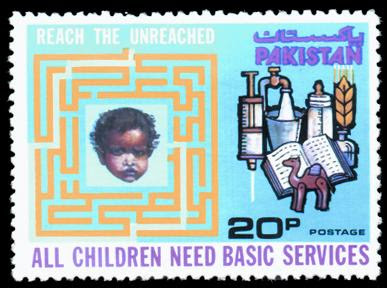 Stamp is horizontal in format. Provision of basic services to children. such as better health care, water supplies, nutrition, education and vocational training are symbolically represented on the right side of the stamp against a blue background. A square maze in yellow colour against a blue background denotes the complex problem of reaching these services to a destitute child whose face appears within a small square inside the maze. The slogan \"Reach the Unreached\" appears at the top of the maze from which a path in light blue colour leads to the destitute child. The caption \"All Children Need Basic Services\" appears at the bottom of the stamp in red colour. \'Pakistan\' in Urdu and English one above the other, appears in red at the top of the blue panel at right. The denomination figure \'20P\' with the world \'postage\' alongside appears in black at the bottom of the blue panel.
Stamp is horizontal in format. Provision of basic services to children. such as better health care, water supplies, nutrition, education and vocational training are symbolically represented on the right side of the stamp against a blue background. A square maze in yellow colour against a blue background denotes the complex problem of reaching these services to a destitute child whose face appears within a small square inside the maze. The slogan \"Reach the Unreached\" appears at the top of the maze from which a path in light blue colour leads to the destitute child. The caption \"All Children Need Basic Services\" appears at the bottom of the stamp in red colour. \'Pakistan\' in Urdu and English one above the other, appears in red at the top of the blue panel at right. The denomination figure \'20P\' with the world \'postage\' alongside appears in black at the bottom of the blue panel.Ever since 1954 when the General Assembly of the United Nations declared unanimously that one day in the year should be set apart for honouring the world\'s children and for reminding us of their special needs, the first Monday of October each year is being observed as Universal Children\'s Day. A special theme is chosen for the day to emphasize a particular problem facing children. This year the theme emphasizes the most basic needs of the most deprived children in the world. The focus is on the fact that \"All Children Need Basic Services\" with a special slogan \"Reaching the Unreached\". On this day, the public media, educators, social scientists and government officials are urged to recognize and publicize children\'s basic needs. As part of this promotional programme, Pakistan Post Office is issuing a special stamp on the day, Throughout the developing world some 250 million children are growing up without the benefit of the most elementary care in health, education, nutrition and social services. The need for these basic services is specially acute in the rural areas. Malnutrition claims the lives of too many children and permanently weakens many others. Women who otherwise might be able to invest their time, talents and energies in improving their families\' wellbeing are forced to spend countless hours in the frustrating drudgery of fetching water from long distance and grinding grain etc. Where schools exist, they are often overcrowded, poorly equipped and staffed by inadequately trained or untrained teachers using outmoded teaching methods and syllabi. Youngsters who manage to survive all these perils of childhood confront a future with neither the protection nor the preparation to lead healthy and productive lives. The piecemeal solutions to these problems have proved ineffective. Accordingly the 1976 UNICEF Executive Board session observed that the needs of children and mothers in un served and under served areas can most effectively be met by developing a group of basic and inter-related services.
The fundamental principles of the approach include the active participation of the community itself in a group of \"interrelated\", mutually-supportive activities ranging from maternal and child health care, including family planning, safe water supply and waste disposal to production and consumption of better food, basic education and simple technologies to lighten the daily tasks of women and girls. The other characteristic is the use of many more auxiliaries by existing national social services network who provide the links between the national services and the \"front-line\" workers in villages and urban shantytowns. Utilization of village level community health workers to better reach the remote and disadvantaged areas is an important feature of the health programme. To protect the children against childhood diseases, the poly immunization programme has been given a high priority. In fact the programme with UNICEF assistance has already been launched on a pilot phase in Islamabad, Peshawar and Karachi, and lessons learned from the experiment will be applied during the expansion phase 1977-1981.
If we can work to fulfill the goals as enunciated, we will have gone a long way in building a larger network of basic services for hundreds of millions of children In developing countries leading to a more peaceful and secure world.










No comments:
Post a Comment